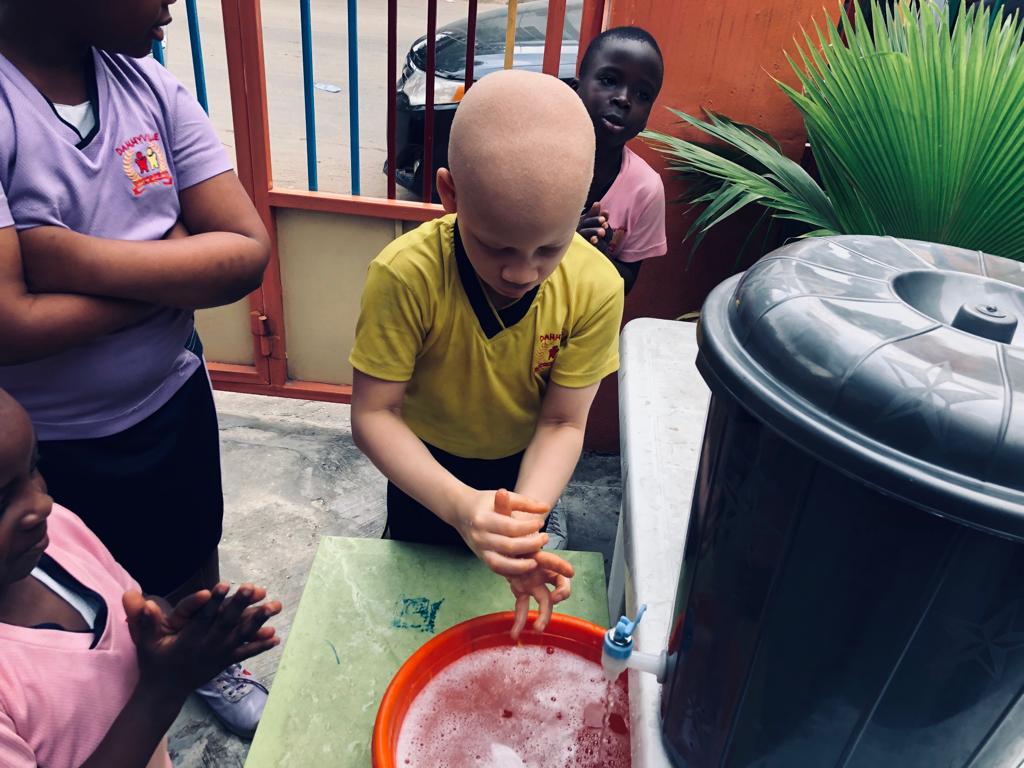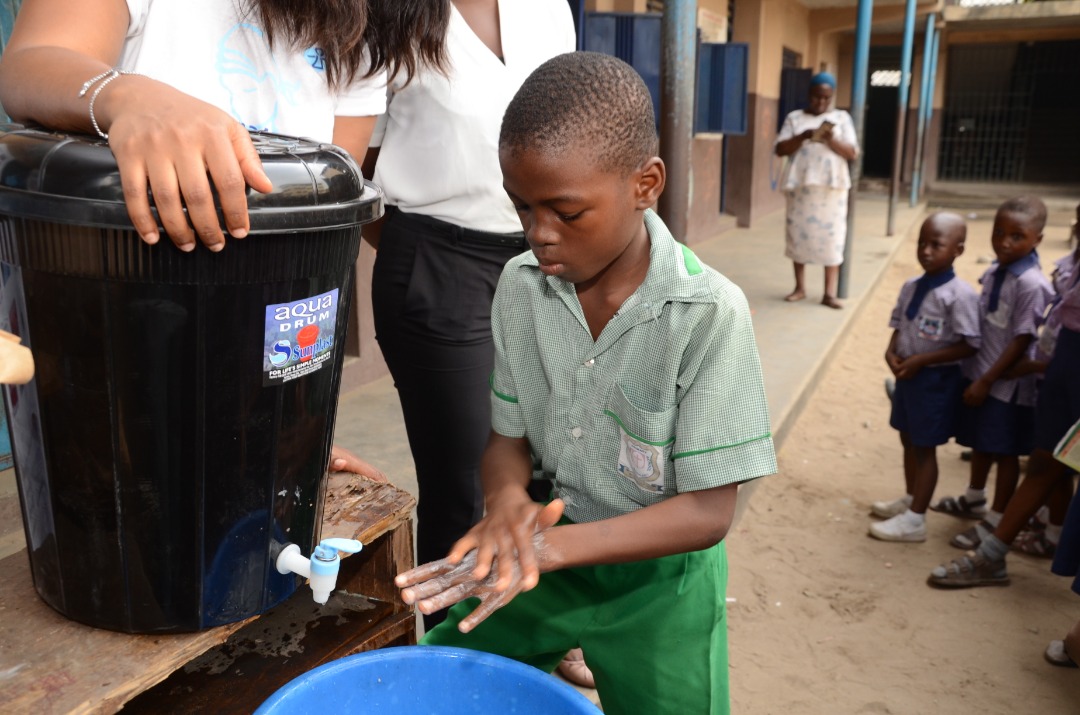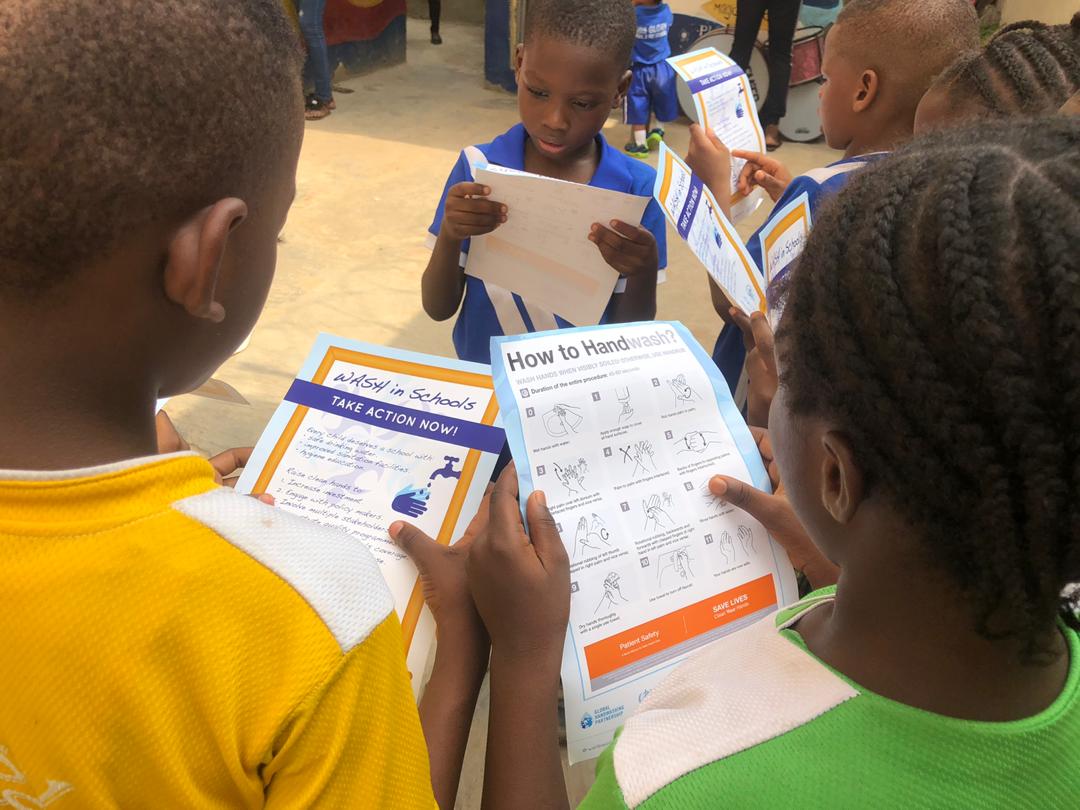“Most primary health centers in Nigeria lack good washing facilities. At the Lugbe PHC, there is no washing sink in the labor room, so water has to be fetched from the tap outside and brought to the mother. A health worker who wants to wash her hands will have to fetch a bucket. It is not possible for us to do our jobs as midwives without access to water, sanitation, and handwashing stations.”
-Rita Momoh, WBFA Midwife
The Wellbeing Foundation Africa and its international donors and partners are committed to improving WASH in healthcare facilities, households, schools and communities across Nigeria and around the world.
The Wellbeing Foundation Africa Midwives are our dedicated interlocutors as Sanitation Angels, delivering key knowledge and best practice techniques at public and private primary, secondary and tertiary health facilities across Nigeria, through our MamaCare360 Antenatal and Postnatal Education Program platform. We teach pregnant and newly delivered mothers, and their medical service providers, the essential elements of birth preparedness, newborn care, nutrition, and water sanitation and hygiene WASH For Wellbeing, for prevention of maternal and newborn sepsis, disease and infection prevention and control, and safer births overall.

Our MamaCare360 WASHForWellbeing classes, delivered by a dedicated team of qualified professional Midwives, take place weekly at all locations, emphasizing key skills of hygiene in health facilities, and environmental and surface hygiene, for maternal, newborn and child survival.
In May 2018, WBFA Founder-President, H.E. Mrs Toyin Ojora Saraki launched a global WASH campaign in Abuja at a meeting with Dr. Wondi Alemu, WHO Representative and Head of Mission in Nigeria. Mrs Saraki announced that the WBFA would work with partners including Global Water 2020, an initiative based in Washington D.C. which is designed to accelerate progress toward water access and security for all people in developing countries, with a particular focus on increasing the availability of WASH in healthcare centres.
A key element of that partnership is advocacy for improved WASH standards, both in Nigeria and around the world.
To that end, in June 2018, Mrs Saraki led a delegation to Washington D.C. to take part in multi-lateral meetings with the US State Department, the World Bank, the Center for Strategic and International Studies, the American Academy of Sciences and members of the United States Congress. The visit was intended as both an information gathering exercise and to engender a new spirit of co-operation on WASH. Each meeting highlighted the extent of the challenge.
For instance, World Bank Data revealed that in Nigeria, WASH indices have actually suffered an alarming decline from an already critical condition. Access to pipe-borne water on premises in urban areas dropped from 30% in 1990, to less than 10% in 2015, and for Nigeria to achieve the WASH SDGs, it must invest at least three times more than it does today.
That visit was followed by a formal submission to the 2018 United Nations High-Level Political Forum on Sustainable Development. The intervention was made in relation to the forum event “Partnerships that Deliver for Girls and Women – an interactive dialogue to break down silos and achieve the SDGs” organised by Women Deliver. Further advocacy took place in August 2018 at World Water Week in Stockholm, the annual focal point for the world’s water issues and this year world leaders will assemble to address the theme ‘Water, ecosystems and human development.’ These public statements and advocacy are and will continue to be supplemented by private, direct interventions with politicians, government departments and global institutions.

Adolescent Skills and Drills, Personal Social And Health Education
Wellbeing Foundation Africa acknowledges the fundamental necessity of gender equality and the empowerment of all women and girls. Throughout our multi-layered strategy of research, advocacy, policy development, community engagement, philanthropy and education, we have prioritized women, adolescent girls, and children within our various programs, focusing on maternal and infant health, as well as sexual, reproductive, mental, and social health in order to empower and strengthen girls and women from birth to old age.
In harmony with Wellbeing Foundation Africa’s mission to successfully deliver the United Nations Sustainable Development Goals 3, 5, and 6 through education, empowerment, and advocacy for accessible and sustainable health in Africa, the Adolescent Skills and Drills, Personal Social and Health Education program and the curriculum was developed specifically for adolescent personal, social, and health education.
The program seeks to educate adolescent girls and boys about their bodies, their relationships, their health, and also on their education. Moreover, the project seeks to build the capacity of the adolescents by equipping them with advocacy tools and tips, thus encouraging them to transfer the knowledge attained during our program to their friends, families, and community members. The cohort of children, aged between 9 and 19 years old, are taught the WHO standard of hand washing techniques in addition to further break-out sessions, in line with the commitment of the WBFA to support the attainment of UN Sustainable Development Goal 6: Ensure availability and sustainable management of water and sanitation for all.
Adolescent PSHE Program in Schools
In the six years since the launch of the Adolescent Personal Social Health Education (PSHE) programme in schools across Kwara, Lagos, Osun, Cross Rivers states (Ogoja), and the FCT, WBFA has turned young girls into campaigners and advocates in their homes and communities as they share the knowledge imparted on them through the programme within their circles.
Using the Wellbeing Foundation Africa Adolescent Skills and Drills PSHE handbook, the program has so far impacted the lives of 9576 adolescents in 39 (26 public and 11 private) schools and 7 communities have been reached across the aforementioned states and the FCT.
The Adolescent Personal, Social, and Health Education Program and handbook addresses subjects concerning girls’ rights, eating healthy, the importance of physical activity, sleep, the risks of drug use/abuse, WASH in schools, the female body, menstrual hygiene management, female genital mutilation, healthy relationships and STEM.

Adolescent PSHE Program in Communities
According to UNICEF, one out of every five out-of-school children is Nigerian. Despite primary education is compulsory, Nigeria still has 10.5 million children between the ages of 5-14 not receiving education in a school. The data also shows an even more endemic problem –more than half of the female population in the country, especially in the North are not in school.
This, coupled with the COVID-19 pandemic which has forced more girls to take up jobs to support their families poses an even more dangerous threat to the quality of life adolescent girls in Nigeria are forced to grapple with. As the lockdown put in place to stem the rate of infection of the Coronavirus was relaxed, WBFA went to work, establishing the Community-based Adolescent PSHE programme, to reach young girls at the community level with the Personal, Social Health Education the Adolescent programme provides.
The Foundation conducted a baseline assessment in the Dutse Makaranta community in Abuja to understand the needs of the girls and it was no surprise that top of the list was sexual and reproductive health. The assessment also revealed a need for continuous engagement of the girls on issues pertaining to sexual and reproductive health as the number of adolescent mothers was high. Also, the assessment revealed that 72% of 60 adolescents present do not have adequate knowledge of hand hygiene. Finally, the assessment revealed that most adolescents present do not have adequate nutritional knowledge as most of them lack knowledge on the use of Iron- Folic Acid supplementation. These results informed the decision of the Foundation in 2021 to expand the coverage of the initial school-based programme and scale up the project to include other communities in the F.C.T.
So far, 4 groups have been set up in the Dutse-Makaranta community in the Federal Capital Territory consisting of an average of 60 adolescent girls per group with whom a trained midwife meets bi-weekly to engage them in Personal, Social, Health and Educational training.
Since its inception, the programme has been self-funded by the Foundation. Now, WBFA seeks the support of partners to impact the lives of more adolescent girls quickly and effectively with information on their sexual and reproductive health, adolescent nutrition, relationships and personal hygiene.
We hope to reduce the classes into smaller groups to enable effectiveness. We also need more trained hands to train and educate key figures within the community in order to support the efforts of the young girls when they return to the community.
Opportunities
- Sexual and Reproductive Health Rights and Knowledge for adolescent girls
- Nutritional Knowledge and Iron Folic Acid supplementation for adolescent girls
- WASH for adolescents
- Advocacy against Gender-Based Violence and harmful practices against adolescents.
